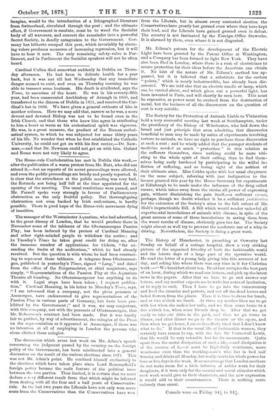The Bishop of Manchester, in preaching at Oawestry last Sunday
on behalf of a cottage hospital, drew a very striking picture of the organised frivolity of both the fashionable world and the leisure days of a large part of the operative world. He read the letter of a young lady giving him this account of her day, and asking him where there was any time in it for Christian work :—" IVe breakfast about ten. Breakfast occupies the best part of an hour, during which we read our letters, and pick up the latest news in the papers. After that we have to go and answer our letters, and my mother expects me to write her notes of invitation, or to reply to such. Then I have to go into the conservatory and feed the canaries and parrots, and cut off the dead leaves and faded flowers from the plants. Then it is time to dress for lunch, and at two o'clock we lunch. At three my mother likes me to go with her when she makes her calls, and we then come home to a five o'clock tea, when some friends drop in. After that we get ready to take our drive in the park, and then we go home to dinner, and after dinner we go to the theatre or the opera, and then when we get home, I am so dreadfully tired that I don't know what to do." If that is the usual life of fashionable women, they certainly have reason to say, with the late Sir Cornewall Lewis, that life would be very tolerable but for its amusements. Quite apart from the moral dissipation of such a life,—and dissipation is of the essence of it,—it must be frightfully wearisome, more wearisome even than the working-man's who lies in bed half Sunday and drinks all Monday, but really exerts his whole power for four or five days in the week. It seems strange that London mothers do not make room for a little infusion of nobler work for their daughters, if it were only for the mental and moral stimulus which such work would give to their characters, and the new expression it would add to their countenances. There is nothing more unlovely than ennui.


































 Previous page
Previous page